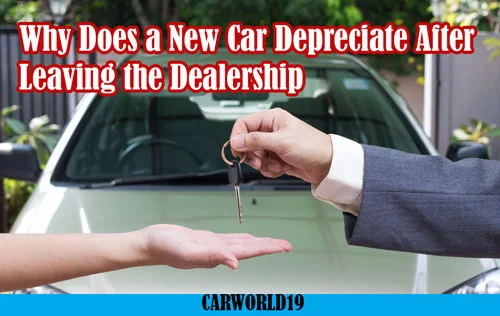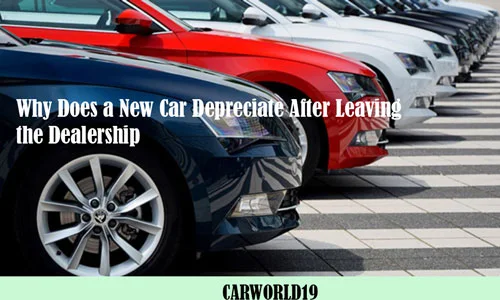Due to first-year depreciation, personal financial experts suggest purchasing a late model used automobile rather than a new one. Learn why the value of new autos drops so quickly.
It's depressing to realize that a new car loses value the moment you drive it off the lot. All automobiles depreciate over time, and there are several causes for this.
 |
| Why Does a New Car Depreciate After Leaving the Dealership? |
The Depreciation Factors
You have committed to paying the dealer a certain sum of money for the automobile when you drive it off the lot. You are now looking at an automobile that is only worth the wholesale amount, even if you only drive it a short distance before changing your mind.
The car's wholesale value is always lower than its initial retail value. This initial depreciation for a new automobile might reach the tens of thousands.
The depreciated worth of an automobile is also influenced by factors including how well you maintain it, the car's model, and its mileage. Some automobiles are more in demand than others, and as a result, they hold their value better over time.
What Kind of Depreciation Can I Expect From My New Car?
After you drive a new automobile off the dealer's lot, it begins to lose value or degrade. According to Bankrate.com, an automobile will depreciate by 15% to 20% a year. A car's value will range from 80% to 85% of its first-year value in the second year, and from 80% to 85% of its second-year value in the third year.
Influences on the Depreciation of a New Car
Depending on the brand, model, year, type, and other characteristics of the automobile, a vehicle's depreciation rate varies. Several suggestions will affect the pace of depreciation for your vehicle if you want to keep as much value as you can for your new automobile.
The shade of your new vehicle
Unbelievably, the color of the automobile will affect how quickly it depreciates. Compared to vehicles with more exotic paint colors, vehicles with neutral paint colors like black or silver keep their worth better.
This is because neutral hues are more likely to be in style in the future and have a better resale value than those that have been tailored to the owner's preferences.
Upkeep and Reputation
Low maintenance, well-regarded high-quality new automobiles offer reduced depreciation rates and strong resale prices.
Brands like Toyota and Honda are known for having excellent maintenance records and exceptionally well-built vehicles.
How to Maintain Your New Car's Value
Many new car owners are always considering the moment when they finally want to resell their vehicle, which is a few steps in the future.
This is only normal considering that not all motorists choose to maintain a car or truck for the whole of its useful life (which may be several decades).
They rely on a good solid used car private sale to move them into a newer vehicle rather than continue to drive an old model. Some people exchange at dealerships. In either case, there are some tips for maximizing the value of your used vehicle.
- Complete the maintenance that is due. Make sure you receive any oil changes and tune-ups to maintain your automobile or truck in the greatest condition over the long run. To maintain a vehicle performing at its best, many shops and dealers provide service based on mileage, such as 60k or 100k mile maintenance. Without these essential inspections, a car or truck that would otherwise be in good condition might be grounded due to serious problems with the engine or other components.
- Save the service logs. A used automobile buyer will frequently want to know how the car was cared for throughout its previous life. You may increase the value of your transaction when you have the service documents on hand, demonstrating that you have completed all maintenance procedures to keep a car in good condition.
- Keep the inside spotless. The inside of a car presents a significant issue when it is being sold again. For a high sale price, the seats, dashboards, and every interior space of the car must be in outstanding condition. Otherwise, the buyer would be put off by poor interior qualities. When a car's interior has visual issues, buyers often try to lower the price.
- Parking the car. Allowing a car's paint to get noticeably worn is another technique to destroy its resale value. A car that has been garaged will have a pristine exterior, which will increase its market value. A decent alternative if you don't have a garage is to keep your car covered with vinyl.
- Maintain facial traits. All of those things start to disappear as a car matures. Electrical elements such as power windows, seats, and other items progressively degrade and quit functioning. The refrigerant leaks or runs out in the air conditioning system. CD players or tape decks start having problematic issues. Each of these will lower the resale price. Avoiding excessive use of features or doing any maintenance before the issues become impossible to solve are two ways to prevent the features' deterioration over time.
- Boost the features. Some owners who seek high resale prices take a step further with features, upgrading their car with stylish add-ons like engine accessories, lighting, tinting, or aftermarket radio components to prepare it for the road ahead. For the finest audio quality inside the car, installing new speakers is one of the most common adjustments.
The aforementioned tips will assist a driver in maintaining a significant portion of the value of what may be a significant investment: a car or truck that will eventually be sold off by the owner.
How to Keep a New Car in Good Shape After Purchase
A new or used automobile purchase is a wonderful experience. A car, though, signifies responsibility, much as your parents may have told you when you had your first driving lesson.
Your duty is to yourself, except in this instance. It will cost you less money in the long term to keep a car in good shape since doing so prevents depreciation, especially if you decide to replace it.
To maintain your car's appearance and performance for as long as possible, follow these easy steps:
- For routine maintenance, refer to the owner's handbook. Make an effort to adhere to the manufacturer-recommended service intervals by consulting the owner's handbook for your vehicle. Although basic maintenance for a car might be expensive, it is significantly less expensive and simpler to budget for than catastrophic repairs. You may typically note the services you do in the owner's handbook. It's a good idea to keep your receipts every time you get your car fixed or undergo maintenance, even a straightforward oil change. This will be useful when you sell the automobile in the future since it demonstrates that you've made an effort to keep it in good condition.
- Keep things tidy. Many people these days are time-constrained, making it difficult to find the time to perform something as basic as vacuum the floor of your car or wipe down the dash. The truth is that keeping your automobile clean will keep it looking younger for longer; this is true not just because there won't be any dirt or rubbish lying around, but also because leaving these items behind causes the interior of your car to deteriorate more quickly. Old beverage cans and cups leak and leave stains. The action of dirt and grit in the carpet is similar to sandpaper being rubbed over the floor, wearing away the fibers much more quickly than they would otherwise. On the vinyl and leather surfaces in the automobile, use armor-all or a comparable cleaner. This shields them from deterioration and sun damage. The inside of an automobile will remain in excellent condition for years if it has been well maintained.
- Observe what your automobile is trying to tell you. Your automobile will send you several various indications if something is wrong. Every so often, get out of your automobile and pay attention to the engine noises. To monitor developments, you should even maintain a record of what you hear. Your owner's handbook generally has a "notes" section in the rear where you may keep track of this. One of the most crucial and sometimes overlooked components of automobile maintenance is checking your fluids regularly. It's simple to accomplish. You only need to do it occasionally; you don't have to do it every day. To ensure that everything in the automobile is maintained at the appropriate levels, try doing it every third gasoline fill-up. Always pay attention to the dashboard's lights and indicators. These are your final alert that there is a severe problem. When one of these warnings appears, you should immediately stop driving and consult your owner's handbook to determine the best course of action to take to protect your automobile.
How to Trade in Your New Car
Your brand-new automobile might need to be sold for one reason or another. You could merely want it gone so you can buy another automobile, or you might find yourself unable to continue paying for it.
Fortunately, if you decide to sell your automobile, you have many possibilities. Here are some things to remember.
Acquiring a Buyer
You will do better if you sell your automobile to an individual rather than using the internet or print classified ads.
You won't often receive the greatest deal when trading in a new automobile for another vehicle. Finding a private buyer who can finance the vehicle on their own, transferring ownership through a title transfer, and the vehicle is then no longer in your possession.
Giving Your Vehicle
There could be instances where giving appears preferable. People who must travel abroad for employment frequently do this since they lack the time to cope with selling their automobiles.
You are still liable for the payments, and until they are finished, you won't be allowed to give the automobile. If you wish to claim a tax deduction, donating your automobile is also a smart move.
Numerous organizations in your community will accept automobile donations. You may find a lot of locations that will pick up the automobile for free cost by conducting a fast Internet search.
Do not simply let it go
Many people who find themselves in financial difficulty may just leave their vehicles. They believe that abandoning it someplace is the wisest course of action if they are unable to make the payments and cannot locate a buyer.
However, this is never the case. You will continue to be liable for the payments to the financing firm. Additionally, abandoned vehicles are more prone to experience vandalism and theft. Any harm will ultimately fall under your purview as well.
Selling a brand-new automobile need not be difficult or stressful. You can discover the ideal buyer if you have the correct resources and some patience.

